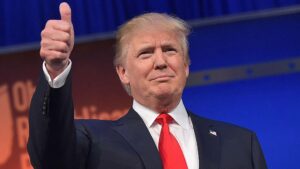 Former U.S. President Donald Trump said on Wednesday he declined to answer questions during an appearance before New York state’s attorney general in a civil investigation into his family’s business practices, citing his constitutional right against self-incrimination.
Former U.S. President Donald Trump said on Wednesday he declined to answer questions during an appearance before New York state’s attorney general in a civil investigation into his family’s business practices, citing his constitutional right against self-incrimination.
Mr Trump had sued in an effort to block the interview at the New York attorney general’s office on Wednesday.
State officials accuse the Trump Organization of misleading authorities about the value of its assets in order to get favourable loans and tax breaks.
Mr Trump denies wrongdoing and has called the civil probe a witch hunt.
An hour after he was pictured arriving at the Manhattan office where he was questioned under oath, Mr Trump released a statement in which he criticised New York Attorney General Letitia James and the broader investigation.
“Years of work and tens of millions of dollars have been spent on this long simmering saga, and to no avail,” he said. “I declined to answer the questions under the rights and privileges afforded to every citizen under the United States Constitution.”
The Constitution’s Fifth Amendment protects against self-incrimination. Trump’s decision not to answer questions still could carry consequences. Should the investigation lead to a trial, jurors could take his silence into account. Politically, it also could give adversaries ammunition about whether Trump has something to hide as he mulls another presidential run in 2024.

ByteDance Refuses TikTok Sale Despite US Pressure, Plans Legal Challenge
Harvey Weinstein’s Rape Conviction Overturned, Paving Way For New Trial
Biden Administration Imposes New Sanctions On Iran Following Attack On Israel
Israel’s European Allies Urge Restraint Amid Escalating Tensions With Iran